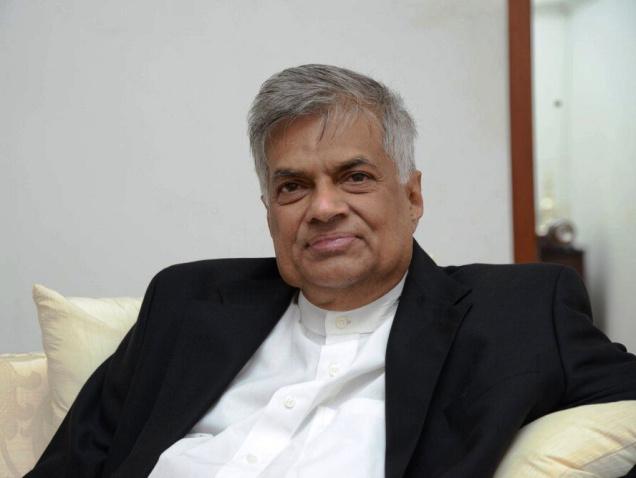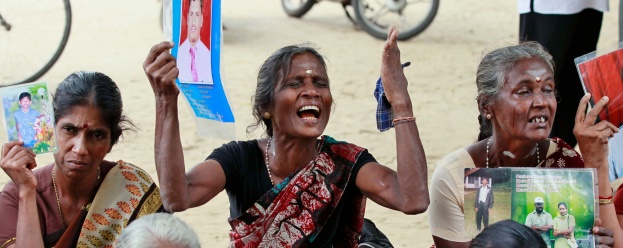by N. Ram.
A day after he assumed office, Sri Lankan Prime Minister Ranil Wickremesinghe spoke to N. Ram, former Editor-in-Chief of “The Hindu”, on a wide range of issues.
Prime Minister Ranil Wickremesinghe is confident and hopeful that the political situation in Sri Lanka following the August 17 general election, although complex, is favourable for forging an enduring political solution to the Tamil question. Noting that the two main national parties, his United National Party and the Sri Lanka Freedom Party, and the Tamil National Alliance were “the three key players” in formulating the proposals for an enduring solution, he said he had “tried to keep the UNP position flexible so that we can bridge the differences.” Responding to a question on former President Chandrika Kumaratunga, he confirmed that she would have a significant role to play in this regard.

(Sri Lankan Prime Minister Ranil Wickremesinghe during an interview to “The Hindu” at his Temple Trees residence in Colombo. Photo: N. Ram)
The Sri Lankan political situation has taken an interesting turn with the narrow victory of the United National Party in the general election, its leader being sworn in as Prime Minister for the fourth time, and the signing of a Memorandum of Understanding between the two main parties, the UNP and the Sri Lanka Freedom Party, paving the way for a ‘unity’ or national government.
A day after he assumed office, Prime Minister Wickremesinghe spoke to The Hindu at Temple Trees on a wide range of issues, including the project of working out a new Constitution for Sri Lanka, finding an enduring political solution to the Tamil question, and livelihood, development, and human rights issues.
Asked about time lost after the war with the LTTE ended in 2009 and the prospects of moving towards an enduring political solution now, Mr. Wickremesinghe responded: “There have been a lot of administrative barriers, which have to be removed. Secondly, there has been a request by some of the Provincial Councils that as far as the powers exercised jointly, by both the Centre and the Provinces, concurrent powers, are concerned, some of it could be transferred to the Provinces. Those are the main issues and we have to work this out.”
To a question about how the two sides could avoid getting caught in a terminological dispute over a ‘unitary’ versus ‘federal’ solution, he said: “Substance is what we have to look at. The formula which was accepted by India also, let’s see how we work it out within the 13th Amendment, maximise it. Let’s build on this. That’s what we are talking about now.”
The Sri Lankan Prime Minister also expressed hope that a political consensus could be reached within months on a new Constitution for Sri Lanka, especially because the issues that needed to be resolved were fairly narrow.
Excerpts of Interview
‘Will work to maximise devolution within 13th Amendment’
Prime Minister, you announced a very ambitious task: working out a new Constitution for Sri Lanka. Will this not take a long time?
Well, the SLFP thinks it will take one year and we think it should take six months. The main issue will be the new system of elections. We are all agreed that it should be a mixed proportional system. But we still haven’t agreed on the break-up between the constituencies and those who come on the general list. There is also the issue of the presidency, with the citizens’ group wanting the executive presidency to be abolished completely while the SLFP is opposed to it. So we said we would have to review the whole thing and then see how we strengthen Parliament. We also have to look at the Provincial Councils and how we make them really work. Those are the main issues we will have to go into.
The international community will be looking to you to provide strong leadership, particularly on the economy.
I think we will go ahead and do well. But I would like to get a consensus — because then it will stay on long after we finish politics.
There is a feeling that the present political situation provides an opportunity to move fairly quickly towards a political solution to what is regarded as your principal national question – the Tamil question in the North and East. You have supported devolution. What are the prospects of making progress towards a permanent political solution? A lot of time was lost after the war ended in 2009.
There have been a lot of administrative barriers, which have to be removed. Secondly, there has been a request by some of the Provincial Councils that as far as the powers exercised jointly, by both the Centre and the Provinces, concurrent powers, are concerned, some of it could be transferred to the Provinces. Those are the main issues and we have to work this out. We have to discuss this, the two main parties and the TNA [Tamil National Alliance], the third one. They will be the three key players in formulating [the proposals].
Over a long period, the Tamils have been emphasising the need to empower the Provincial Council or Councils with respect to land and police powers. There were efforts to resolve these issues but nothing came of them.
I think a lot of people are satisfied with land. The real issue in the North and the East now is re-settlement of people who got evicted from their land — in Jaffna and in the East. We say that subject to the main issues of national security, we will release the land. The services, the armed forces, are working out the modalities. As far as police powers are concerned, I think there is a lot of re-thinking going on — on the politicisation of the police and that we should not allow that. So let the Independent Police Commission be strengthened further and look at this, then see what role the Provincial Councils play. We all have had our experiences – the politicisation of the police under President [Mahinda] Rajapaksa. We will all work at it. We accept the fact that the Provincial Council must have a say in the law and order situation, no going back on that.
The terminological gap remains. One side speaks of a ‘federal’ solution. The Constitution on the other hand provides for a ‘unitary’ state. Is it not possible to avoid getting caught in a terminological dispute but instead concentrate on the substance of what you call ‘devolution’ or what perhaps can be called ‘a substantial measure of self-administering opportunities within a united and undivided Sri Lanka’?
Substance is what we have to look at. Actually even today, the devolved powers in Sri Lanka are sometimes more than the powers given in federal Constitutions. So let us look at how we could work this whole system out and go ahead. The formula which was accepted by India also, let’s see how we work it out within the 13th Amendment, maximise it. Let’s build on this. That’s what we are talking about now.
You are confident about making progress?
I think we should be able to do that.
And on the human rights issues, there is a demand for an international investigation. But clearly there is a consensus in Sri Lanka that the investigation should be domestic.
We have agreed it is domestic for the simple reason that we did not sign the Statute of Rome. The commitment that was given by the Rajapaksa administration to the U.N. Human Rights Council (UNHRC) in 2009 could be interpreted in many ways. At one stage they were moving towards international investigation. But we always said, the UNP, that there was no legal basis for international investigation within Sri Lanka; it had to be domestic. The reason some of the people have been calling for international investigation is the loss of confidence in the judiciary. We’ve had this problem before, in the North and in the South. We would like to put forward a domestic mechanism which would be within the four corners of our Constitution but would also be acceptable to all the communities in Sri Lanka plus the international community.
What kind of role do you see former President Chandrika Kumaratunga playing at this juncture?
She heads the Office for National Unity. She is also now playing a leading role in the SLFP. And she chaired the Committee which drafted the MoU from their side. President Maithripala Sirisena and the former President Kumaratunga have a moderating influence in the SLFP and I think they are spearheading a movement to revive the SLFP brand, as we call it. We, the UNP, never gave up identity; we may have alliances but we never gave up identity. The SLFP is suffering the consequence of submerging their identity in the UPFA and having personality cults.
She can also play in helping forge a political solution to the Tamil question. When she was President, there were some good ideas in the constitutional proposals made at that time.
She has. So let’s look at common meeting points. I have tried to keep the UNP position flexible so that we can bridge the differences.
The arrangement that you and the President have initiated rules out what would have been unseemly defection — some MPs breaking away from the SLFP to join you. Was that ever on?
We decided that wouldn’t be the way. We could have got ten or fifteen people over from the other side but then again, it would have put the President in a very, very embarrassing position. But if we could cooperate with the SLFP, that was far more advantageous to us than getting fifteen of them over. Because we are trying to set a national framework for at least the next ten years. We didn’t have an overall majority in Parliament. But then we had to have a working system. Now, if you look at India, the BJP has an overall majority, a clear majority, in the Lok Sabha but they are in a minority in the Rajya Sabha. So everything is divided, nothing is moving. I didn’t want to come to that state or to be fighting for every piece of main legislation. It’s better we agree and get this through and see how it works out. If it succeeds, every one will be on board. If it doesn’t succeed, people will go their own way. But I am a hundred per cent confident that we can succeed. We have tremendous issues to resolve, more than our personal or political rivalries. The employment issue; how you are going to fit into the international economy; restoring national democracy; working on national unity; upgrading our system of education; free education, free health; and the national debt. Instead of shouting at who was responsible, let’s see how we get out of where we are.
Finally, on international relations. Is there going to be a real change in approach now?
A lot of people are unhappy about the approach taken by President Rajapaksa. I think that was a mistake; we shouldn’t have antagonised the west. Our approach is: we get back to having the close relations we had with the West and with India while maintaining our relationship with China, which has also been a longstanding one. And looking at our own role in the region and what stand we will take on some of the main international issues.
Since there is so much on your plate by way of domestic issues, will you be able to devote time to some of your favourite projects, like the land bridge between Sri Lanka and India?
We will first have to get the country moving — that’s the priority — and then to look at all other issues.
